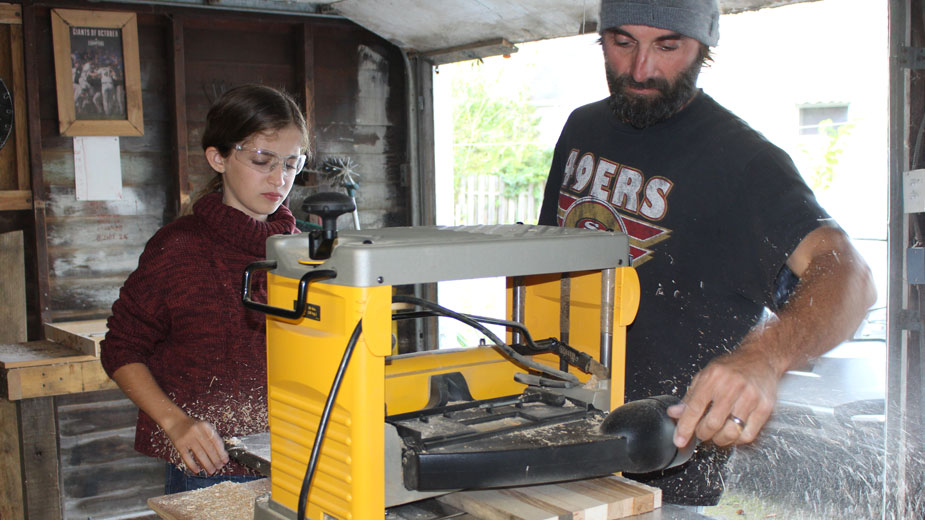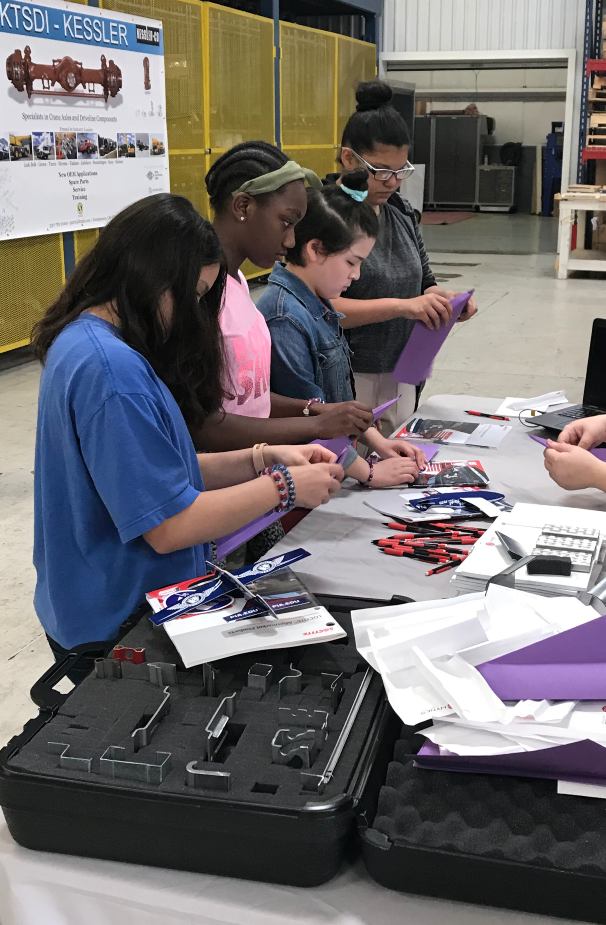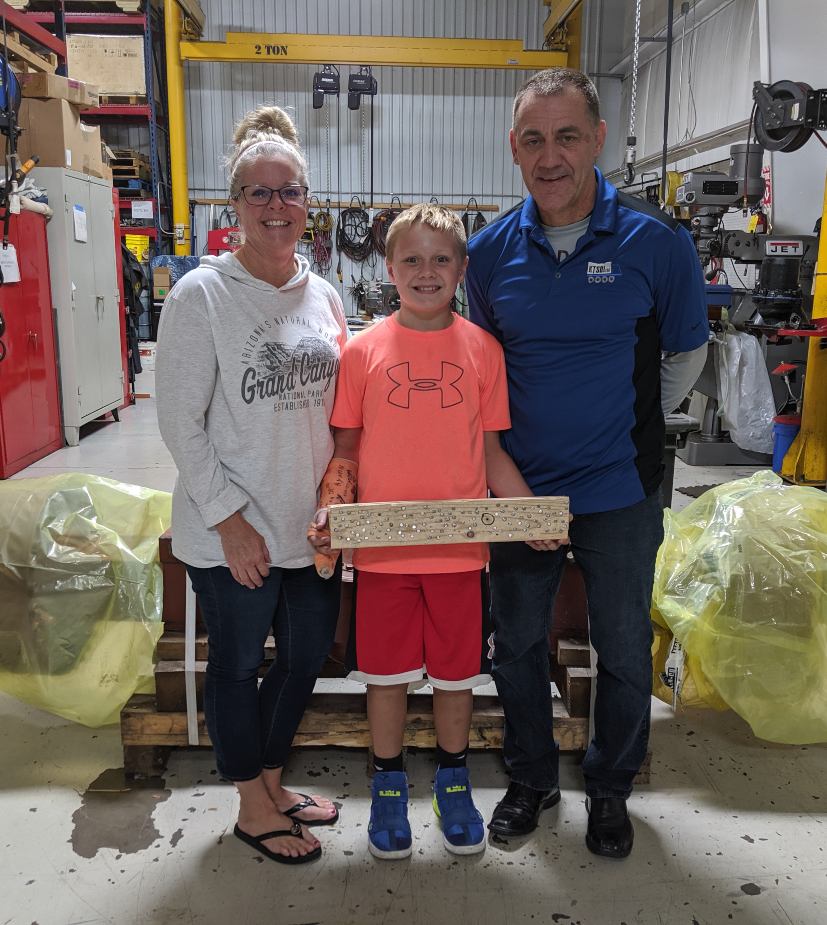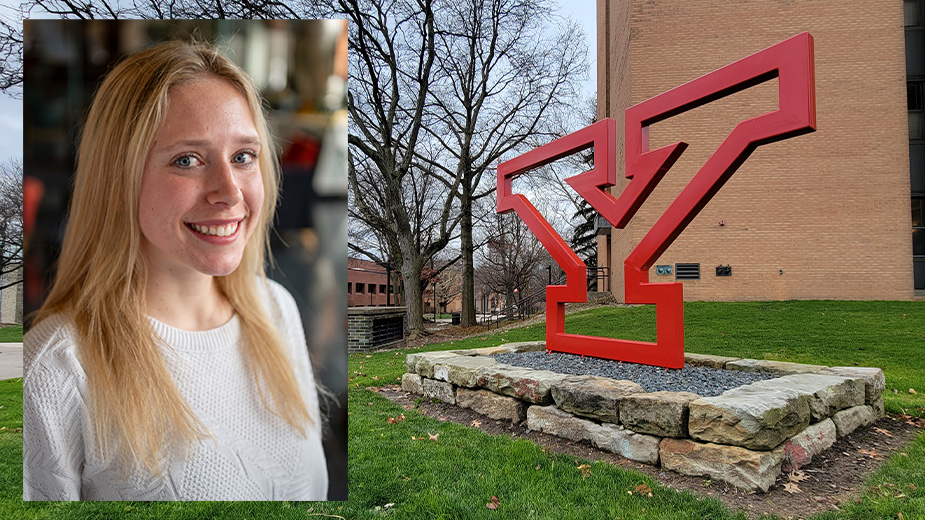Girls Get Hands-On STEM Education at Institute
By Jeremy Lydic
YOUNGSTOWN, Ohio – Watching Lucy Papini help her father, Ken, in his woodshop at their home in Boardman, it’s clear she’s a chip off the old wood block.
Ken works at International Steel and Counterweights in Youngstown; woodworking is his hobby.
As he built the family’s dining-room table and the desk where Lucy does her homework, the 12-year-old watched and caught the bug to work with her hands.
The two have been making cutting boards from reclaimed wood. Lucy helps with just about every step of the process, from gluing the pieces to operating the planer and sanding them down. Ken lets her run the miter saw under his supervision.
Operating power equipment is second-nature to Lucy after participating in the Summer Manufacturing Institute for the last three years. Organized in partnership by Oh Wow! The Roger & Gloria Jones Children’s Center for Science & Technology and YWCA Mahoning Valley, the Summer Manufacturing Institute, or SMI, includes three week-long camps of science, technology, engineering and mathematics – STEM – experiences.
Over five days, each cohort tours manufacturers in the region and gets hands-on with a showcase project.
During her time at SMI, Lucy learned how to use sanders, soldering irons and nail guns – tools she had never used before the camp, but is now comfortable handling.
“I liked how hands-on it was and that we got to do that stuff,” she says. “That’s something that I could do in college and get an actual job with it. It seems like a good idea.”

That is a main goal of the Summer Manufacturing Institute, say Ralf Urbach and Kate Landry, Oh Wow director of Edutainment and Edutainer, respectively.
Over the last seven years, Oh Wow has seen increased attendance with the camps, they say.
This year, Oh Wow and the YWCA hosted an all-girls camp that focused on transportation. For their showcase project, students chose among a drone, car or hovercraft, using kits to build the vehicles.
As an added challenge, Urbach removed a part from each kit, such as a wheel or drone propeller, “so they had to engineer it, manufacture it,” he says.
The idea was to challenge students’ problem-solving ability and put to work the skills they learned during the camp.
“I wanted them to struggle and I wanted to see them work through those struggles and find a way to get their drone to fly or find a way to get their car to move,” Urbach says.
The first two days of camp are spent visiting manufacturers, of which Oh Wow works with about 40 companies.
This year, the students visited a Tesla dealership in Pittsburgh, where they saw the service department and got to question the workers there.
At the end of each week, students display their completed projects during a showcase event with the manufacturers they visited.
The idea of having an all-girls camp came about because many manufacturers say they have difficulty in hiring women to work on the shop floor, Urbach says
“I think it’s just perceived, along with a few other fields, as that’s a man’s field,” Landry adds. “People have a certain view of it that isn’t necessarily accurate.”
In past years, only a few girls participated in the Summer Manufacturing Institute. “This year was nearly three weeks packed full” with as many as 50 from grades four through eight, Urbach says.
“There’s so many opportunities there for educators and parents and adults to be able to open not just one door, but many doors for all students,” he says. “When you pick up a screwdriver, it doesn’t matter if you’re a man, a woman, you’re blue, green, yellow – it does not matter. Pick it up and we’re going to show you how to use it.”

To gauge the effectiveness of the program, a grant from the Community Foundation of the Mahoning Valley enabled Oh Wow to conduct a third-party evaluation with Thomas P. Miller & Associates, Indianapolis.
Tracking the information will allow Oh Wow to leverage additional grant dollars to expand the program, Landry says.
The evaluation included analysis of surveys SMI participants took before and after the camp, gauging their knowledge of manufacturing.
After the one-week camp, participants gained greater interest in manufacturing careers, greater awareness of manufacturing jobs and were more knowledgeable about budgeting and safety, the evaluation hows.
However, more data are needed to know the full extent of the program’s effectiveness. Landry recently completed a five-day visit to museums in Canada with similar programs to learn how they expanded, she says.
A supplemental survey found that the parents were “really positive toward the experience,” says Maureen Hoffmann, project consultant with Thomas P. Miller.
“All the parents said they were satisfied or more than satisfied with the camp and rated the quality of the camp as high,” Hoffmann says. “Parents also felt that their children were learning something valuable during the week.”
Varada Bhide, chief operating officer of the YWCA, says her son, Arnav, participated for four years. As a result, Arnav has developed an interest in mechatronic engineering, which focuses on electrical and mechanical systems.
Until the Summer Manufacturing Institute, Arnav had no interest in the trades and wanted to be a police officer or firefighter, he says. However, learning how to make things work “is a great feeling” that sparked an interest in building things, he says.
“It was very hands-on and took me to a lot of places to show me how things really work,” he says. “Without these camps, we can never get more people to get into these kinds of careers. And it helps us decide what we’re going to do later in life.”
The decision to make the camp all female this year wasn’t met favorably by all, Varada Bhide says. SMI was originally intended to be only for girls in an effort to encourage them to pursue manufacturing jobs so they can earn a good living wage, Bhide says. The pilot program was co-ed to increase participation, she says.
“We want to encourage girls to participate and learn in an encouraging environment so they are not disengaged from these careers,” Bhide says. “If we try to change their mindsets from the beginning when they’re younger, I think that will help them with their career choices.”
There is a “missing piece of the puzzle” in early elementary education that encourages girls to continue with exploring STEM, says Emily Coelho, childcare-site administrator with YWCA. SMI gives them the opportunity to explore STEM careers, she says.
“It gives them a choice. It lets them know and empowers them to have the knowledge about skilled training,” Coelho says.
Melissa Papini, Lucy’s mother, agrees. The opportunity afforded by SMI will encourage more girls to get involved in the trades, which will have a “really positive impact on the workforce,” she says.
Hands-on work experiences help visual learners grasp math and science concepts more easily than classroom work alone, she says, particularly in their household where both she and her husband have hands-on hobbies – Ken with woodwork, she with crafts.
“It’s a natural thing for both of our children to work with their hands and think about life in three-dimensional terms,” she says.
Lucy is pursuing her interests and joined the Makers Club at Boardman Glenwood Junior High School, where she attends seventh-grade. Her first project: remaking a Plinko board that she made during her first week of SMI.
“I just want to remake it to see if I can improve upon it from before,” she says.
Melanie Timmings also sees the need for girls to have that opportunity.
“When I was going to school, I don’t ever remember any type of STEM activities coming to our school to be a part of,” she says.
Timmings’ son, Ryan, participated in SMI two years, although he’s been exposed to manufacturing at a young age. His dad, Ken, is owner of KTSDI Inc. in New Middletown, one of the manufacturers SMI often tours – and a company that Ryan plans to take over when Ken retires.
The fifth-grader at Boardman Center Intermediate School keeps busy at the shop, already pushing a broom and mopping floors once each week. But it’s the engineering and the work that really attracts Ryan, he says.
“Everytime I hear a drill, I want to go over there and see what they’re doing,” he says, “because it makes me interested about what they’re trying to do to fix something.”

In Ryan’s first year with SMI, he built a small-scale model of a house with solar-powered lights, he says.
The second year, he built a car with LED lights that had to run along a track. Students used soldering irons to attach components to a circuit board and learned to cut pieces of wood to assemble the track.
The idea of her 10-year-old son using power tools is “growing on me,” says Melanie Timmings. But seeing the difficulty manufacturers have in hiring skilled workers, she understands the necessity, she says.
“It’s definitely Ken’s passion in life to make the kids well aware because we know everybody’s not college-bound,” she says. “There needs to be more awareness.”
Two of their nieces in Ken’s native country of Canada are finishing apprenticeships as a carpenter and mechanic, respectively, but “that’s in another country,” Ken Timmings says.
In Canada, the opportunities are “really promoted,” he says. While opportunities are available regionally, parents need to encourage their offspring to pursue them, he says.
“They don’t understand that in this business those guys out on the floor are making $50,000, $60,000 a year,” and may or may not have a college degree, he says.
“As long as these parents are able to envision their kids with a successful job or career without getting their hands dirty or hands-on, what is the degree of success of a four-year degree and flipping burgers because there’s no other jobs?”
Copyright 2024 The Business Journal, Youngstown, Ohio.


